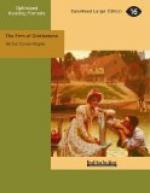Whatever an impartial judge might think of the means whereby Major Tobias Clutterbuck had successfully screwed a thousand pounds out of the firm of Girdlestone, it is quite certain that that gentleman’s seasoned conscience did not reproach him in the least degree. On the contrary, his whole being seemed saturated and impregnated with the wildest hilarity and delight. Twice in less than a hundred yards, he was compelled to stop and lean upon his cane owing to the breathlessness which supervened upon his attempts to smother the delighted chuckles which came surging up from the inmost recesses of his capacious frame. At the second halt he wriggled his hand inside his tight-breasted coat, and after as many contortions as though he were about to shed that garment as a snake does its skin, he produced once more the little fat pocket-book. From it he extracted the cheque and looked it over lovingly. Then he hailed a passing hansom. “Drive to the Capital and Counties Bank,” he said. It had struck him that since the firm was in a shaky state he had better draw the money as soon as possible.
In the bank a gloomy-looking cashier took the cheque and stared at it somewhat longer than the occasion seemed to demand. It was but a few minutes, yet it appeared a very long time to the major.
“How will you have it?” he asked at last, in a mournful voice. It tends to make a man cynical when he spends his days in handling untold riches while his wife and six children are struggling to make both ends meet at home.
“A hunthred in gold and the rest in notes,” said the major, with a sigh of relief.
The cashier counted and handed over a thick packet of crisp rustling paper and a little pile of shining sovereigns. The major stowed away the first in the pocket-book and the latter in his trouser pockets. Then he swaggered out with a great increase of pomposity and importance, and ordered his cabman to drive to Kennedy Place.
Von Baumser was sitting in the major’s campaigning chair, smoking his china-bowled pipe and gazing dreamily at the long blue wreaths. Times had been bad with the comrades of late, as the German’s seedy appearance sufficiently testified. His friends in Germany had ceased to forward his small remittance, and Endermann’s office, in which he had been employed, had given him notice that for a time they




